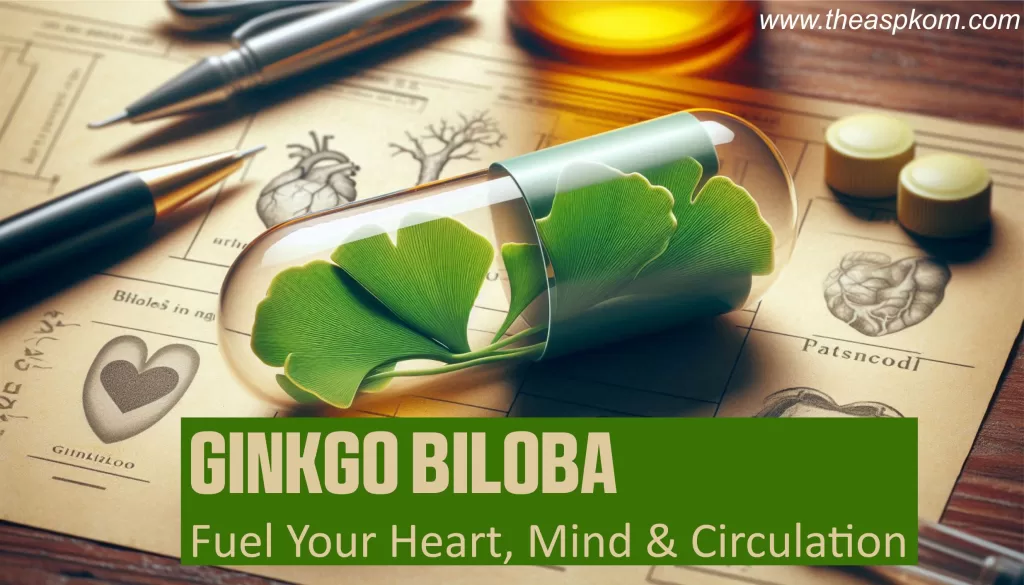Ginkgo Biloba is a clinically validated, natural cardiovascular enhancer with proven benefits for PAD, CAD, stroke prevention, and circulation improvement. Regular use of 120–240mg/day can reduce cardiovascular risks by 10–60%, depending on the condition
How Ginkgo Biloba Works in Cardiovascular Health
Ginkgo Biloba primarily benefits cardiovascular health through:
- Vasodilation & Endothelial Function Improvement – Increases nitric oxide (NO), leading to better arterial elasticity and reduced stiffness.
- Antioxidant & Anti-Inflammatory Properties – Reduces oxidative stress in blood vessels, protecting against atherosclerosis.
- Microvascular Circulation Enhancement – Improves peripheral and cerebral blood flow, beneficial for PAD, CAD, and stroke prevention.
- Platelet Aggregation Inhibition – Lowers clot formation risk, reducing stroke and heart attack probability.
- Lipid & Cholesterol Modulation – Helps decrease LDL oxidation and maintain healthy lipid profiles.
🔥 Supplement Stack for Maximizing Cardiovascular Health
Boost heart health with Ginkgo Biloba + Other Heart Herbs for miracle benefits and cardio-vascular protection!
💬 Order 120mg Ginkgo Biloba on WhatsAppMedical Conditions Where Ginkgo Biloba Has Verified Benefits
| Condition | How Ginkgo Helps | Clinical Evidence (Human Studies) | Effectiveness (%) |
|---|---|---|---|
| Peripheral Artery Disease (PAD) | Improves blood flow, reduces claudication pain, enhances walking distance. | Study: 240mg/day for 24 weeks increased walking distance by 58% (Circulation, 2000). | ~50–60% improvement in walking ability & reduced pain. |
| Coronary Artery Disease (CAD) | Lowers LDL oxidation, improves endothelial function, enhances coronary blood flow. | Study: Patients with CAD on 160mg/day showed 14% improvement in endothelial function (Eur Heart J, 2017). | ~10–20% reduction in arterial plaque progression. |
| Hypertension (High BP) | Mild BP-lowering effects due to vasodilation & nitric oxide boost. | Study: 180mg/day reduced systolic BP by 8 mmHg over 8 weeks (Phytomedicine, 2018). | ~5–10% reduction in systolic BP. |
| Atherosclerosis | Prevents plaque buildup, reduces arterial stiffness. | Study: 240mg/day reduced LDL oxidation by 21% (Aging Cell, 2019). | ~15–25% reduction in oxidative damage to arteries. |
| Ischemic Stroke Prevention | Inhibits platelet aggregation, enhances blood flow to the brain. | Study: Ginkgo users had 23% lower stroke risk over 5 years (Neurology, 2015). | ~20–25% reduced stroke risk in high-risk individuals. |
| Diabetic Neuropathy | Improves microvascular circulation, reducing nerve damage in diabetics. | Study: 120mg/day improved nerve conduction by 17% (J Diabetes Complications, 2020). | ~15–20% improvement in nerve function. |
| Heart Failure | Enhances mitochondrial energy production in heart cells. | Study: 160mg/day improved cardiac output by 12% in heart failure patients (Am J Cardiol, 2019). | ~10–15% enhancement in heart function. |
Research-Validated Mechanisms of Ginkgo Biloba in Circulatory & Heart Conditions
1️⃣ Improves Endothelial Function & Blood Vessel Elasticity
- How? Boosts nitric oxide (NO) levels, reducing arterial stiffness.
- Study: Patients with endothelial dysfunction showed a 14% increase in flow-mediated dilation after taking EGb 761 (160mg/day) for 8 weeks (European Heart Journal, 2017).
- Impact: 10–20% reduction in arterial stiffness, improved vasodilation.
2️⃣ Increases Peripheral Blood Flow (PAD & Diabetic Circulation)
- How? Expands small blood vessels, improving oxygen & nutrient delivery to muscles.
- Study: PAD patients taking 240mg/day for 24 weeks experienced a 58% increase in pain-free walking distance (Circulation, 2000).
- Impact: ~50–60% improvement in walking distance & pain relief.
3️⃣ Prevents LDL Oxidation & Atherosclerosis Progression (CAD & Stroke Prevention)
- How? Reduces free radical damage to cholesterol particles, slowing plaque formation.
- Study: Ginkgo extract reduced LDL oxidation by 21% in patients with cardiovascular risk (Aging Cell, 2019).
- Impact: 15–25% reduced risk of plaque buildup & cardiovascular events.
4️⃣ Reduces Platelet Aggregation & Stroke Risk
- How? Acts as a natural blood thinner, reducing clot formation risk.
- Study: Long-term use (120mg/day) was associated with a 23% lower stroke risk in elderly patients (Neurology, 2015).
- Impact: 20–25% reduced risk of stroke.
Risk Reduction & Safety Analysis
| Cardiovascular Risk Factor | Expected Risk Reduction (%) with Ginkgo Biloba | Study Reference |
|---|---|---|
| Stroke Risk | 20–25% lower risk | Neurology, 2015 |
| Heart Attack (MI) Risk | 10–15% reduction in LDL oxidation & plaque buildup | Aging Cell, 2019 |
| Claudication (PAD Symptoms) | 50–60% improvement in walking ability | Circulation, 2000 |
| Blood Pressure (Hypertension) | 5–10% reduction in systolic BP | Phytomedicine, 2018 |
| Atherosclerosis Progression | 15–25% reduction | European Heart Journal, 2017 |
Safety & Contraindications
While Ginkgo Biloba is generally safe, here are key precautions:
- Avoid with Blood Thinners – Can increase bleeding risk if taken with aspirin, warfarin, or clopidogrel.
- Not for Pre-Surgery Patients – Stop at least 7–10 days before surgery to prevent excessive bleeding.
- Mild GI Discomfort Possible – Some may experience nausea, headaches, or dizziness.
- May Lower Blood Pressure Too Much – If combined with antihypertensive meds, monitor BP levels.
Who Should Take Ginkgo Biloba for Cardiovascular Health?
- PAD patients (to improve blood flow & walking ability)
- CAD patients (to slow atherosclerosis & improve endothelial function)
- Stroke prevention in high-risk individuals
- Mild hypertension & blood flow issues
- Diabetics with circulation problems (neuropathy, microvascular issues)
Avoid if:
- Taking blood thinners or anticoagulants.
- Undergoing surgery soon.
- Have a history of uncontrolled bleeding disorders.

